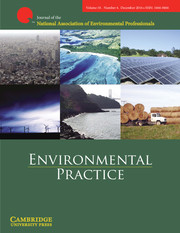No CrossRef data available.
Article contents
BOOK REVIEW: Environmental Due Diligence: A Professional Handbook
Published online by Cambridge University Press: 03 April 2008
Extract
Environmental Due Diligence: A Professional Handbook. Kenneth S. Tramm and Ernest C. Crosby. 2006. Infinity Publishing, West Conshohocken, PA. 434 pp. $67.95 paperback.
This book is a concise and comprehensive summary of information needed by professionals conducting evaluations to determine whether a location is contaminated and in need of cleanup. Since the USEPA has recently established clarified expectations in the form of its All Appropriate Inquiry Rule (40 CFR Part 312, pursuant to the 2002 Small Business Liability Relief and Brownfields Revitalization Act), this book is timely. It is an extremely useful text not just for anyone conducting or seeking to perform this aspect of environmental consulting, but also for those in organizations owning or dealing in real property who use (or should use) the services of environmental professionals. This is because the law places responsibility on many parties for cleaning up contamination, and that responsibility has been interpreted by courts to be strict, joint, and several, and, for the most part, retroactive and perpetual. The only way to manage responsibility for cleanup is to go into commercial property deals with your eyes open—by conducting a thorough pre-purchase evaluation. You either learn that you don't want the property because it will come with a likely cleanup, or you take your chances because one seems unlikely. In the latter case you want to be able to take advantage of the defenses for innocent landowners, or “brownfields” developers, in case you are wrong and it turns out the place is indeed contaminated. These defenses are, with few exceptions, only afforded to those who have conducted such evaluations with “due diligence.”
- Type
- FEATURES & REVIEWS
- Information
- Copyright
- © 2007 National Association of Environmental Professionals




